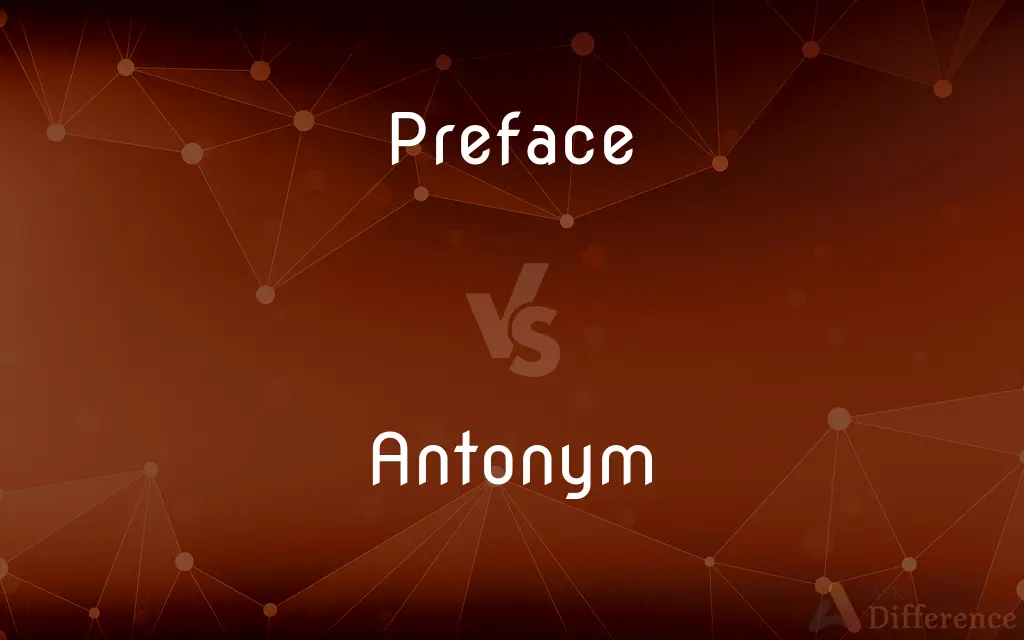Preface vs. Antonym — What's the Difference?
By Tayyaba Rehman & Maham Liaqat — Updated on April 4, 2024
A preface is an introductory section of a book or document, providing insight into its purpose or background, while an antonym is a word that has the opposite meaning of another word.

Difference Between Preface and Antonym
Table of Contents
ADVERTISEMENT
Key Differences
A preface serves as the doorway to a literary work, offering readers a glimpse into the author's intentions, the book's genesis, or acknowledgments of assistance and inspiration. It sets the tone for the reader's journey, sometimes revealing personal stories or the context in which the work was created. On the other hand, an antonym pertains strictly to the domain of language and semantics, representing a concept entirely distinct from literary introductions. Antonyms are fundamental to the structure and variety of language, allowing for the expression of contrasting ideas and feelings.
While a preface is crafted by the author to introduce a specific work, providing a unique insight into the text that follows, antonyms exist independently of any single document or author's intent. They are a part of the lexical structure of language, essential for communication and education. Whereas a preface is unique and varies from one literary work to another, antonyms are universal in nature, consistent across texts and contexts where the same language is used.
The content of a preface can vary widely, encompassing the author's motivations, the challenges faced during the writing process, or the intended impact of the work on its audience. In contrast, antonyms are straightforward, with their meaning and use governed by the rules of the language and the context in which they are used. They do not convey variable information or subjective insights but are fixed in their oppositional relationship to other words.
Prefaces are optional and may not be present in all books or documents, depending on the author's choice or the work's nature. They are a creative choice, adding value through background information and personal touch. Antonyms, however, are an intrinsic part of language, necessary for the articulation of complex thoughts and the nuances of meaning. They do not require an author's intervention to exist or be understood, as their significance is embedded in the language itself.
The comparison between a preface and an antonym highlights the contrast between an element of literary composition and a fundamental linguistic concept. One offers a personal or contextual gateway to a specific text, while the other facilitates linguistic expression through the presentation of opposite meanings.
ADVERTISEMENT
Comparison Chart
Definition
An introductory section of a book or document.
A word with the opposite meaning of another word.
Purpose
To introduce and provide insight into a text.
To express contrasting ideas or meanings.
Nature
Subjective and unique to each text.
Universal and consistent across a language.
Presence
Optional, depending on the author's choice.
Intrinsic part of language and communication.
Role in Text/Language
Sets the tone and context for a literary work.
Enhances linguistic expression and understanding.
Compare with Definitions
Preface
A personal introduction to a book, often containing the author's motive for writing it.
The preface detailed the decade-long research that went into the book.
Antonym
A word opposite in meaning to another.
Hot is an antonym of cold.
Preface
A preliminary statement in a book by the book's author, explaining its scope, purpose, or background.
The preface of the novel provided insights into the author's childhood.
Antonym
A vocabulary term used to describe a word that has a contrary meaning to another word.
Full is the antonym of empty.
Preface
A section at the beginning of a book, usually written by the author, to introduce and justify the work.
The preface explained the historical context of the story.
Antonym
A tool in language to express negation or opposition.
Victory and defeat function as antonyms in certain contexts.
Preface
An introductory part of a text that sets the context for the reader.
In her preface, the author thanked her mentors and family.
Antonym
A pair of words that are opposite in meaning, enhancing language diversity.
Ascend and descend are antonyms.
Preface
The part of a book that precedes the main text and contains introductory remarks.
The preface included a brief summary of each chapter.
Antonym
Linguistic expressions that convey contrasting concepts.
Accept and reject are antonyms.
Preface
A preface () or proem () is an introduction to a book or other literary work written by the work's author. An introductory essay written by a different person is a foreword and precedes an author's preface.
Antonym
A word having a meaning opposite to that of another word
The word "wet" is an antonym of the word "dry.".
Preface
A preliminary statement or essay introducing a book that explains its scope, intention, or background and is usually written by the author.
Antonym
(semantics) A word which has the opposite meaning of another word.
“rich” is an antonym of “poor”; “full” is an antonym of “empty”
Preface
An introductory section, as of a speech.
Antonym
A word that describes one end of a scale, while its opposite describes the other end, such as large versus small; a gradable antonym.
Preface
Something introductory; a preliminary
An informal brunch served as a preface to the three-day conference.
Antonym
A word of opposite meaning; a counterterm; - used as a correlative of synonym.
Preface
Often Preface The words introducing the central part of the Eucharist in several Christian churches.
Antonym
Two words that express opposing concepts;
To him the opposite of gay was depressed
Preface
To introduce by or provide with a preliminary statement or essay.
Preface
To serve as an introduction to.
Preface
A beginning or introductory portion that comes before the main text of a document or book, typically serving to contextualize or explain the writing of the book and sometimes to acknowledge others' contributions.
The book included a brief preface explaining the author's motivations for writing.
Preface
An introduction, or series of preliminary remarks.
Preface
(Roman Catholic) The prelude or introduction to the canon of the Mass.
Preface
A title or epithet.
Preface
(transitive) To introduce or make a comment before (the main point).
Let me preface this by saying that I don't know him that well.
Preface
(transitive) To give a preface to.
To preface a book
Preface
Something spoken as introductory to a discourse, or written as introductory to a book or essay; a proem; an introduction, or series of preliminary remarks.
This superficial taleIs but a preface of her worthy praise.
Heaven's high behest no preface needs.
Preface
The prelude or introduction to the canon of the Mass.
Preface
To introduce by a preface; to give a preface to; as, to preface a book discourse.
Preface
To make a preface.
Preface
A short introductory essay preceding the text of a book
Preface
Furnish with a preface or introduction;
She always precedes her lectures with a joke
He prefaced his lecture with a critical remark about the institution
Common Curiosities
What makes a good preface?
A good preface effectively sets the tone, provides background, and engages the reader with personal insights or the significance of the work.
How do antonyms enhance language?
Antonyms enhance language by allowing for the precise expression of contrasting ideas, enriching communication and comprehension.
Can a book have both a preface and an introduction?
Yes, a book can have both, with the preface providing the author's personal insight, while the introduction presents an overview of the book's content.
What is the purpose of a preface in a book?
The purpose of a preface is to introduce the book, providing insight into its creation, purpose, and what readers can expect.
Is a preface written by the author?
Typically, yes, the preface is written by the author to share their personal commentary or the backstory of the book.
Does every book need a preface?
Not every book needs a preface; its inclusion depends on whether the author wishes to provide additional context or personal remarks.
Are antonyms always clear-cut in meaning?
Not always; the clarity of antonyms can depend on context, as some words may have nuanced or multiple opposite meanings.
Can antonyms be subjective?
While the basic concept of antonyms is straightforward, their usage and interpretation can vary with context, making some pairings somewhat subjective.
How are antonyms used in education?
Antonyms are used to teach vocabulary, enhance reading comprehension, and improve expressive language skills by illustrating contrasting meanings.
Are synonyms and antonyms opposites?
Yes, in a way; synonyms are words with similar meanings, while antonyms are words with opposite meanings, both serving to enrich language.
Share Your Discovery

Previous Comparison
Trial vs. Test
Next Comparison
Carbonite vs. CarbonateAuthor Spotlight
Written by
Tayyaba RehmanTayyaba Rehman is a distinguished writer, currently serving as a primary contributor to askdifference.com. As a researcher in semantics and etymology, Tayyaba's passion for the complexity of languages and their distinctions has found a perfect home on the platform. Tayyaba delves into the intricacies of language, distinguishing between commonly confused words and phrases, thereby providing clarity for readers worldwide.
Co-written by
Maham Liaqat















































